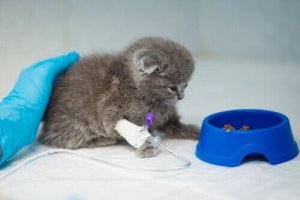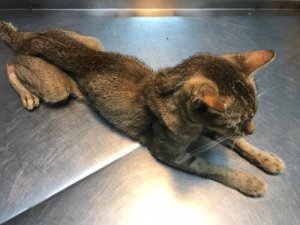How Long Can You Leave a Cat Alone?


Written and verified by the biologist Paloma de los Milagros
When planning a family getaway, pet owners often ask themselves how long they can leave their cat alone. When making this decision, it’s important to be aware that there are a number of different factors that need to be taken into account, such as age and personality.
Pets get used to spending time alone in the house on a daily basis, while their owners are out at work or making the most of their free time. However, there are times when owners can be away for longer than usual, even up to a few days.
Unlike dogs, birds, fish, and cats can go for longer periods of time without their owners. However, in spite of their famed independence, cats require a lot more dedication and affection. Owners who spend a lot of time away risk leaving their pets without food, in poor conditions, and a terrible emotional state.
How long can you leave a cat alone?
We don’t want to give an exact limit on how much time you leave your cat alone, as it will depend on a number of different factors. However, there are some basic things you’ll need to take into account:
- Age: elderly cats and kittens under six months old shouldn’t spend more than four hours alone. Kittens require small, regular meals throughout the day. If left alone for long periods of time, there’s a risk they may run out of food, and become lonely. Similarly, elderly cats generally become more dependent on their owners.

- Diet: Adult cats living on a dry diet can be left alone for approximately 48 hours, as long as they have enough food. Tinned and other types of cat food are often eaten quickly. That means the animal won’t have anything else to eat for a prolonged period of time. Furthermore, cats that live on a wet diet generally produce softer feces. This could lead to a rapid deterioration in their living conditions.
- Climate: People often prefer to go away during the summer months. However, the high temperatures mean your pet will drink a lot more water than usual. In fact, a lack of water can be more deadly than a lack of food. So, even if you provide plenty of water, it’s best not to be away too long.
How long can a cat survive without food?
Sometimes, even if a cat has access to plenty of food, an underlying illness can cause it to lose weight.
Among the many chronic illnesses that cause weight loss in cats there are a number of renal and oral diseases, as well as arthritis. Stress factors such as moving house or the arrival of a new member of the family can also cause a cat to stop eating and lose weight.

The maximum amount of time a cat can survive without food is roughly two weeks. That’s as long as it has access to plenty of water. However, this will also depend on several other factors. For example, this time frame will be significantly reduced if the cat is suffering from a serious illness.
How well an animal can survive without food for a prolonged period will also depend on its situation. A stray cat is normally better at surviving extremes of temperature and food shortages.
You can try to stimulate your cat’s appetite by changing their diet or making it into a game by hiding small portions of food for them to find. If your cat still isn’t eating after a few days, it’s vital that you take them to the vet. Never let your cat get to the point where it’s emaciated or malnourished.
Cats are independent animals, and underlying problems can easily go unnoticed by owners. Any significant changes in eating habits or behavior are sufficient reasons to take them for a check-up. This will help ensure you catch any issues early on.
All cited sources were thoroughly reviewed by our team to ensure their quality, reliability, currency, and validity. The bibliography of this article was considered reliable and of academic or scientific accuracy.
- Cohan, M. (S.f). PetMD. Why Your Cat Can’t Go Without Food. Recuperado de https://www.petmd.com/cat/conditions/digestive/why-your-cat-cant-go-without-food
- Mypet. How Long Can You Safely Leave a Cat Alone? (S.f). Recuperado de http://www.mypet.com/basic-pet-care/how-long-can-you-safely-leave-a-cat-alone.aspx
- Travelingwithyourcat. How Long Can Cats Go Without Food? (S.f). Recuperado de https://www.travelingwithyourcat.com/how-long-can-cats-go-without-food/
This text is provided for informational purposes only and does not replace consultation with a professional. If in doubt, consult your specialist.